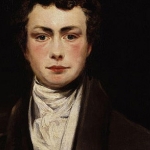May the Babylonish curse,
Strait confound my stammering verse,
If I can a passage see
In this word-perplexity,
Or a fit expression find,
Or a language to my mind,
(Still the phrase is wide or scant)
To take leave of thee, GREAT PLANT!
Or in any terms relate
For I hate, yet love, thee so,
That, whichever thing I shew,
The plain truth will seem to be
A constrained hyperbole,
And the passion to proceed
More from a mistress than a weed.
Sooty retainer to the vine,
Bacchus' black servant, negro fine;
Sorcerer, that mak'st us dote upon
Thy begrimed complexion,
And, for thy pernicious sake,
More and greater oaths to break
Than reclaimed lovers take
'Gainst women: thou thy siege dost lay
Much too in the female way,
While thou suck'st the laboring breath
Faster than kisses or than death.
Thou in such a cloud dost bind us,
That our worst foes cannot find us,
And ill fortune, that would thwart us,
Shoots at rovers, shooting at us;
While each man, thro' thy heightening steam,
Does like a smoking Etna seem,
And all about us does express
(Fancy and wit in richest dress)
A Sicilian fruitfulness.
Thou through such a mist dost shew us,
That our best friends do not know us,
And, for those allowed features,
Due to reasonable creatures,
Liken'st us to fell Chimeras,
Monsters that, who see us, fear us
Worse than Cerberus or Geryon,
Or, who first lov'd a cloud, Ixion.
Bacchus we know, and we allow
His tipsy rites. But what art thou,
That but by reflex can'st shew
What his deity can do,
As the false Egyptian spell
Aped the true Hebrew miracle?
Some few vapours thou may'st raise,
The weak brain may serve to amaze,
But to the reigns and nobler heart
Can'st nor life nor heat impart.
Brother of Bacchus, later born,
The old world was sure forlorn,
Wanting thee, that aidest more
The god's victories than before
All his panthers, and the brawls
Of his piping Bacchanals.
These, as stale, we disallow,
Or judge of thee meant - only thou
His true indian conquest art
And, for ivy round his dart,
The reformed god now weaves
A finer thyrsus of thy leaves.
Scent to match thy rich perfume
Chemic art did ne'er presume
Through her quaint alembic strain,
None so sov'reign to the brain.
Nature, that did in thee excel,
Fram'd again no second smell.
Roses, violets, but toys
For the smaller sort of boys,
Or for greener damsels meant;
Thou art the only manly scent.
Stinking'st of the stinking kind,
Filth of the mouth and fog of the mind,
Africa, that brags her foyson,
Breeds no such prodigious poison,
Henbane, nightshade, both together,
Hemlock, aconite —
Nay, rather, Plant divine, of rarest virtue;
Blisters on the tongue would hurt you.
'Twas but in a sort I blam'd thee;
None e'er prosper'd who defam'd thee;
Irony all, and feign'd abuse,
Such as perplext lovers use,
At a need, when, in despair
To paint forth their fairest fair,
Or in part but to express
That exceeding comeliness
Which their fancies doth so strike,
They borrow language of dislike;
And, instead of Dearest Miss,
Jewel, Honey, Sweetheart, Bliss,
And those forms of old admiring,
Call her Cockatrice and Siren,
Basilisk, and all that's evil,
Witch, Hyena, Mermaid, Devil,
Ethiop, Wench, and Blackamoor,
Monkey, Ape, and twenty more;
Friendly Trait'ress, loving Foe, —
Not that she is truly so,
But no other way they know
A contentment to express,
Borders so upon excess,
That they do not rightly wot
Whether it be pain or not.
Or, as men, constrained to part
With what's nearest to their heart,
While their sorrow's at the height,
Lose discrimination quite,
And their hasty wrath let fall,
To appease their frantic gall,
On the darling thing whatever
Whence they feel it death to sever,
Though it be, as they, perforce,
Guiltless of the sad divorce.
For I must (nor let it grieve thee,
Friendliest of plants, that I must) leave the.
For thy sake, TOBACCO, I
Would do any thing but die,
And but seek to extend my days
Long enough to sing thy praise.
But, as she, who once hath been
A king's consort, is a queen
Ever after, nor will bate
Any tittle of her state,
Though a widow, or divorced,
So I, from thy converse forced,
The old name and style retain,
A right Katherine of Spain;
And a seat, too, 'mongst the joys
Of the blest Tobacco Boys;
Where, though I, by sour physician,
Am debarr'd the full fruition
Of thy favours, I may catch
Some collateral sweets, and snatch
Sidelong odours, that give life
Like glances from a neighbour's wife;
And still live in the by-places
And the suburbs of thy graces;
And in thy borders take delight,
An unconquer'd Canaanite.





















Comment form: